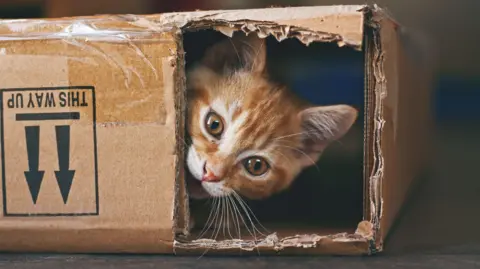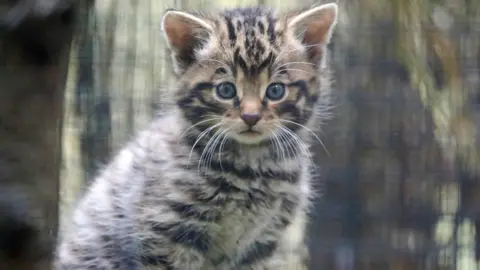‘No cat ban in Scotland’ First Minister John Swinney confirms

 Getty Images
Getty ImagesScotland will not ban cats, the first minister has confirmed after animal experts suggested restrictions on their movements should be considered in some areas.
The Scottish Animal Welfare Commission (SAWG), which advises ministers on animal welfare, had urged them to look further into the pros and cons of “compulsory containment” of cats in certain parts of Scotland.
The report into responsible cat ownership, said cats could have a “significant impact on wildlife populations” by attacking other animals, breeding with wildcats and competing for resources.
A Scottish government spokesperson said they would “fully consider the recommendations” but John Swinney has now ruled out a ban.
“We have absolutely no intention of banning cats. There’s no way that’s going to happen,” he told BBC Scotland.
Pressed on whether the Scottish government might consider a curfew for cats, he said: “I’m giving you a very clear statement – we’re not going to do that.”
The welfare report said up to 700 million birds, mammals and reptiles are thought to be killed by domestic cats across the UK each year.
Experts from the Scottish Animal Welfare Commission (SAWC) said one possible option might be to keep cats at home in certain rural areas.
The idea of cat containment orders could apply to new housing developments where wildlife, including Scottish wildcats, were at particular risk from the pets.
Other possible measures include compulsory microchipping across Scotland, increasing vaccinations and neutering cats living in vulnerable areas.
 Royal Zoological Society of Scotland
Royal Zoological Society of ScotlandThe report said: “New housing developments in rural areas could have a stipulation that cats may not be kept in conservation-sensitive areas/other areas that have not had high levels of predation, especially with red-listed or amber-listed birds/other species.”
The advisers recommended that government agency NatureScot commission another report looking in more detail at the idea of cat containment zones.
Permanent or seasonal at containment areas have already been implemented in other countries, including parts of Australia, where wildlife may be at risk.
Residents have to keep domestic cats within the boundaries of their property.
SAWC chairwoman Cathy Dwyer, who is professor of animal behaviour and welfare at Scotland’s Rural College, told BBC Radio Four’s Today programme that in some areas cats could “potentially” be kept indoors or on leads.
She said one of the concerns was “hybridisation of domestic cats with our Scottish wildcats”.
Cat welfare
“That’s reached such a point where pure Scottish wildcats were virtually extinct and there’s really been action to bring those animals back. These are one of our mega charismatic animals,” she added.
However, Prof Dwyer, acknowledged that a balance had to be struck which also safeguarded the welfare of domestic cats.
“Of course, we understand that keeping a cat locked up inside all the time, it is really difficult to provide for their welfare, so it’s really about striking a balance between protecting Scottish wildlife and ensuring cats have good welfare,” she said.
Microchipping of all domestic cats is currently not compulsory in Scotland, unlike in England and Wales, and this was another recommendation from the advisers.
“A proper database allows us to see where cats have come from and reduce the number of strays and feral cats, which have very poor welfare in Scotland – they are not well adapted to live in Scotland,” Prof Dwyer said.
A Scottish government spokesperson said: “We recommend that all cat owners should consider microchipping their pets, and ensuring the information held on them is kept up to date, as the best way of being reunited should they become lost or separated.
“We will fully consider the recommendations of the Scottish Animal Welfare Commission.”
Source link







